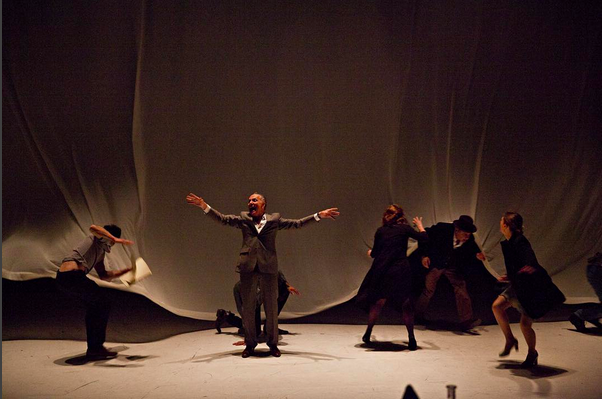Six Characters in Search of an Author
by Luigi Pirandello
translated and adapted by François Regnault
Théâtre de la Ville
Singapore International Festival of Arts 2015: Post-Empire
Victoria Theatre, Singapore
The play begins with a group of actors preparing for a rehearsal of a Pirandello play at the hands of an exacting Director. They are interrupted by the appearance of the titular six characters in mourning garb: a family comprising the Father, the Mother, the Son, the Step-Daughter, the Adolescent and the Little Girl. The Father explains that they are unfinished characters whose author is nowhere to be found and would like their story to be completed. The Director is so compelled by their tale that he eventually decides to stage it using his actors.
The Crystalwords score: 4/5
translated and adapted by François Regnault
Théâtre de la Ville
Singapore International Festival of Arts 2015: Post-Empire
Victoria Theatre, Singapore
There's no easy way to sum up Pirandello's Six Characters in Search of an Author. It's a classic of absurdist theatre: a layered, richly metatheatrical play that challenges the traditional notions of author, actor and audience.
This sleek adaptation by François Regnault is brilliantly directed by Emmanuel Demarcy-Mota, Artistic Director of the Théâtre de la Ville, as part of the Singapore International Festival of Arts. For a play originally written in Italian back in 1921, it's incredible how fresh and organic this new French translation feels.
The play begins with a group of actors preparing for a rehearsal of a Pirandello play at the hands of an exacting Director. They are interrupted by the appearance of the titular six characters in mourning garb: a family comprising the Father, the Mother, the Son, the Step-Daughter, the Adolescent and the Little Girl. The Father explains that they are unfinished characters whose author is nowhere to be found and would like their story to be completed. The Director is so compelled by their tale that he eventually decides to stage it using his actors.
What follows is a memorable sequence where the characters re-enact a deeply traumatising scene where the Father had apparently seduced the Step-Daughter in a shop owned by an enigmatic Madame Pace. The actors then try to recreate this scene by imitating the characters. However, this is not deemed to be good enough by the characters and a tense confrontation ensues. What is reality, the play asks us? Is it that of the characters who are, to all intents and purposes, the very embodiment of the emotions being portrayed? Or are both versions of the story - by the characters and the actors - necessarily suspect because they are clearly a act of performance before us, the 'real' audience? What, fundamentally, constitutes dramatic truth?
Demarcy-Mota has his heart in the right place by giving us a version of the play that is an exquisite tapestry of both lightness and weight, confidently blending slapstick comedy with tender drama. In his hands, Six Characters emerges as both a blazing satire of the world of theatre and its intrinsically constructed nature and a deeper exploration of what real emotions mean.
Part of the success of this production is that there is a uniformly strong cast. Hugues Quester cuts an impressive figure as the solemn, imposing Father and is ably supported by Valérie Dashwood's fiery Step-Daughter and Céline Carrère's delightfully kooky Madame Pace who speaks in bizarre hybrid of French and Italian. Alain Libolt endows the Director with the right mix of megalomania and fastidiousness. Even small parts, like Pascal Vuillemot's cheeky Carpenter, are beautifully played.
The visual treatment in particular is breathtaking and there is commendable work by set and lighting designer Yves Collet. A clump of inverted trees descends magnificently on the stage in the final scene set in a garden. Light and shadows are used beautifully; one of the enduring images is the final tableau where the characters appear to fade away as silhouettes behind a screen while the Step-Daughter hovers closer and closer, ultimately breaking this boundary and 'crossing over' to our side. We, like the actors, are left wondering what exactly is a dream and what is reality.
 |
| Photo Credit: JL Fernandez |
The visual treatment in particular is breathtaking and there is commendable work by set and lighting designer Yves Collet. A clump of inverted trees descends magnificently on the stage in the final scene set in a garden. Light and shadows are used beautifully; one of the enduring images is the final tableau where the characters appear to fade away as silhouettes behind a screen while the Step-Daughter hovers closer and closer, ultimately breaking this boundary and 'crossing over' to our side. We, like the actors, are left wondering what exactly is a dream and what is reality.
One cannot deny that aspects of Pirandello's text prove somewhat unsatisfactory. For all its intellectual richness and density, the play does not succeed in truly arresting our emotions. One hardly has time to empathise with the brooding Adolescent and his sudden suicide feels overly dramatic. Harping on and on about the Step-Daughter's supposed seduction seems to sideline other stories that may be just as compelling. The Characters, for all their insistence on presenting true, unvarnished emotions, still emerge as stereotypes to some extent: the worried Mother, the angry Son, the sweet Little Girl.
Nonetheless, one cannot think of a better way of presenting this flawed and complex tumble of ideas for an audience and keeping it utterly engaging. An admirable effort from Demarcy-Mota and his team at the Théâtre de la Ville and a wonderful, stimulating night out at the theatre.
The Crystalwords score: 4/5




Comments
Post a Comment